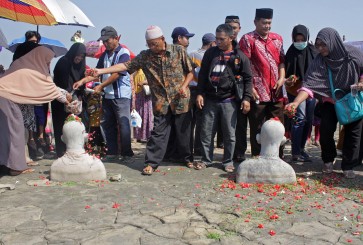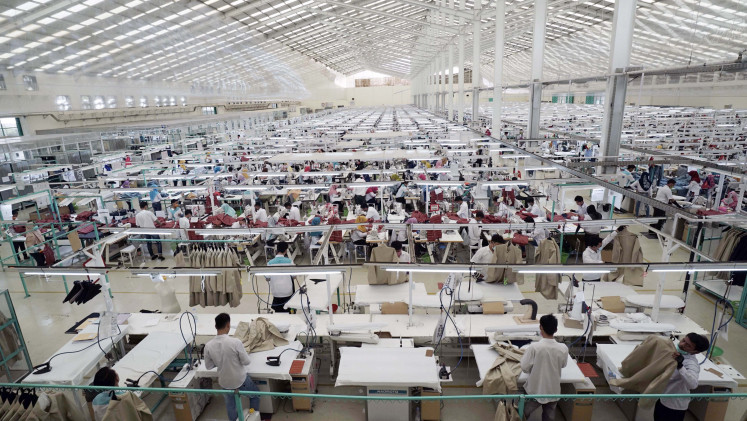Marzuki Alie outmaneuvers the war on corruption
House of Representatives Speaker Marzuki Alie has brought controversy to the war on corruption in this country
Change text size
Gift Premium Articles
to Anyone

H
ouse of Representatives Speaker Marzuki Alie has brought controversy to the war on corruption in this country. He urged forgiveness for graft fugitives so long as they come home and return the money.
As if that were not enough, he made another controversial statement calling for the dismantling of the Corruption Eradication Commission (KPK) following the latest controversy surrounding a number of top KPK officials.
Marzuki is notorious for controversial remarks that people often say are foolish. People still remember what he told victims of the tsunami that devastated the Mentawai Islands off West Sumatra in late October last year. “If you’re afraid of waves, don’t live by the shore,” he told local fishermen.
His idea to forgive the graft fugitives indicates that he is always busy producing political jokes instead of offering the best solution for the country’s burning issues.
As a political joker, what he did could be categorized as testing the waters — a move to measure the public’s reaction.
However, this move is risky. It peddles sensationalism instead of making sense. Is it sensible and possible for corrupt politicians and businessmen to bring back the money they have stolen? Come on, Marzuki! It is not like a contest where the winner receives a gold medal for returning state funds. This nation will go down the drain and bankrupt while waiting for graft fugitives to return the assets they stolen from the state.
His tendency to go against the mainstream will leave a permanent impression in people’s minds that he is an inconsistent politician who is unsure about the country’s legal reform agenda.
Pardoning graft fugitives means fighting corruption might be resolved under the table, which, in turn, eliminates public control.
Marzuki may argue that his bid aims to educate the public to support different ways of fighting corruption. Unfortunately, his “creativity” has flopped considering that the public stands united in wanting to punish graft fugitives.
He has not learned that he is not Abdurrahman “Gus Dur” Wahid, the former Indonesian president and intellectual who acknowledged for his provocative thoughts. As for Marzuki, he has turned into a bad political entertainer, showing that he has an abysmally small amount of brains and zero value as a politician.
When it comes to the proposal for dismantling the Corruption Eradication Commission (KPK), it reflects Marzuki’s frustration on the war against corruption in this country.
To be more specific, he was tired of the anti-corruption body’s response to previous corruption cases. While making his statement, he failed to acknowledge the public’s fatigue with elected representatives that seem not to comprehend the need to confront the cancerous corruption that is eating the Indonesian people.
Amid growing concern over criminalizing the KPK, Marzuki should guard the institution despite its defects. Strong and continuous political support for the punishment of corruption, particularly from the House, is necessary with a view to fending off political negotiations.
Political negotiation has made those accused of taking bribes untouchable since the police, prosecutors and lawyers have been proven guilty of receiving bribes from graft fugitives.
It is hard for people to take at face value the position of political parties that want the KPK to be dismantled. Nobody can guarantee they have never received a bribe or were entangled in corruption.
It seems that Marzuki is demonstrably wrong in his thinking. He applied the idea of deconstruction, proposing to take the KPK apart just because some of its leaders are
implicated in corruption.
His thinking shows a terrible fallacy in considering the body’s problematic leaders as representative of the whole picture.
If it is the case then it would be also better-off disbanding the House in view of its countless scandals, as iterated by former vice president Jusuf Kalla.
Furthermore, the idea of dismantling the KPK is logically unacceptable since the body is simply a scapegoat for a tense political elite struggling to fight those who fight corruption.
The KPK, therefore, is needed to safeguard and strengthen the anticorruption system.
Despite his repeated commitment to eradicate corruption, forgiving the graft fugitives and dismantling the KPK are likely to bring about rehabilitation of the graft fugitives. In so doing, the international community may recognize Indonesia for breaking the world record for the most lenient country for graft fugitives or criminals.
Those exploring every avenue to rehabilitate the criminals will be regarded as hurting people’s sense of justice. People have been bored and disappointed by stories of a pickpocket or a cacao thief going to court while a billion-rupiah corruptor’s life is secure.
As a result, it sets the scene for increasing the presence of legal and business mafias in this country.
A nation committed to the implementation of democracy gets stronger so long as it advocates justice by treating people equal before or above the law.
Pardoning corruptors or disbanding the KPK eventually make democracy no longer belong to people, but guided by rotten politicians and corrupt businesspeople manipulating the country’s legal loopholes.
The writer, a graduate of the University of Canberra, is a lecturer at Andalas University, Padang.









